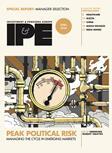AUSTRIA - The European Commission has called for a review of some aspects of Austria's pension reform in order to make long-term prospects “more certain”.
The Commission said that because pension reform was so central to Austria’s stability programme it was “crucial” for pension spending to be strictly monitored. And it added that the factors behind the proposed savings of the reform needed to be more transparent.
“Therefore, some aspects of the pension reform, such as the 10% cap and an excessively long transition period for abolishing early retirement need to be reviewed, to render long-term expenditure more certain,” the Commission said in its assessment of the 2003 update of Austria's stability programme, which it approved.
The Commission's criticism of the 10% cap on benefit losses echoes the International Monetary Fund. Last November the IMF said there would be a number of "undesirable effects" of the reform's 10% cap - for example, severing the notional link between contributions and benefits.
"This cap should be revisited with a view to minimizing its undesirable effects while, at the same time, providing a cushion especially for low-income pensioners," the IMF said at the time.
Economic and monetary affairs commissioner Pedro Solbes said today: "The recently enacted pension reform has improved Austria's budgetary position over the medium term. Still, further structural spending cuts as envisaged by the programme are essential to the success of the strategy."
The Commission also approved Finland's stability programme and the convergence programmes for Denmark and Sweden.
For Finland, Solbes said the government's planned pension reforms needed "to be implemented with determination".
Denmark's public finances, he said, "remain in a good position to handle the projected rise in expenditure due to the ageing of the population". But this was conditional on the medium-term projections being realised. These projections "assume an increase in employment rates and a lower future growth of public consumption expenditure".
Sweden appeared "to be in a relatively good position to meet the budgetary costs associated with ageing populations".
In November the International Monetary Fund said Austrian pension reform would boost the country's long-term fiscal sustainability.
The Austrian government made a series of major changes to the Allgemeines Sozialversicherungsgetz, the largest public scheme which covers around 75% of workers, last year.
The changes saw early retirement being phased out during 2004-17 by a raising of the early retirement age to 65, a reduced accrual rate and a higher bonus for late retirement.












No comments yet